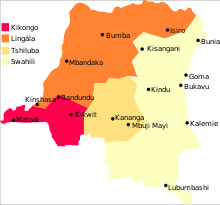Kikongo
| Kongo | |
|---|---|
| Kikongo | |
| Native to | Angola, Democratic Republic of the Congo, Republic of the Congo |
|
Native speakers
|
(ca. 6.5 million cited 1982–2012) 5 million L2 speakers in DRC (perhaps Kituba) |
|
Niger–Congo
|
|
| Language codes | |
| ISO 639-1 | kg |
| ISO 639-2 | |
| ISO 639-3 |
Individual codes: kng – Koongo ldi – Laari kwy – San Salvador Kongo (South) yom – Yombe |
| Glottolog |
core1256 (Core Kikongo; incl. Kituba & ex-Kongo varieties)yomb1244 (Yombe)
|
H.14–16 |
|
 |
|
Kongo or Kikongo is one of the Bantu languages and is spoken by the Kongo and Ndundu people living in the tropical forests of the Democratic Republic of the Congo, the Republic of the Congo and Angola. It is a tonal language. It was spoken by many of those who were taken from the region and sold as slaves in the Americas. For this reason, while Kongo still is spoken in the above-mentioned countries, creolized forms of the language are found in ritual speech of Afro-American religions, especially in Brazil, Cuba, and Haiti. It is also one of the sources of the Gullah language and the Palenquero creole in Colombia. The vast majority of present-day speakers live in Africa. There are roughly seven million native speakers of Kongo, with perhaps two million more who use it as a second language.
Kikongo is the base for a creole used throughout the region: Kituba, also called Kikongo de L'état or Kikongo ya Leta ("Kongo of the state" in French or Kongo), Kituba and Monokituba (also Munukituba). The constitution of the Republic of the Congo uses the name Kitubà, and the one of the Democratic Republic of the Congo uses the term Kikongo, even if Kituba is used in the administration.
At present there is no standard orthography of Kikongo, with a variety in use in written literature, mostly newspapers, pamphlets and a few books.
Kongo was the earliest Bantu language which was committed to writing in Latin characters and had the earliest dictionary of any Bantu language. A catechism was produced under the authority of Diogo Gomes, a Jesuit born in Kongo of Portuguese parents in 1557, but no version of it exists today.
...
Wikipedia
